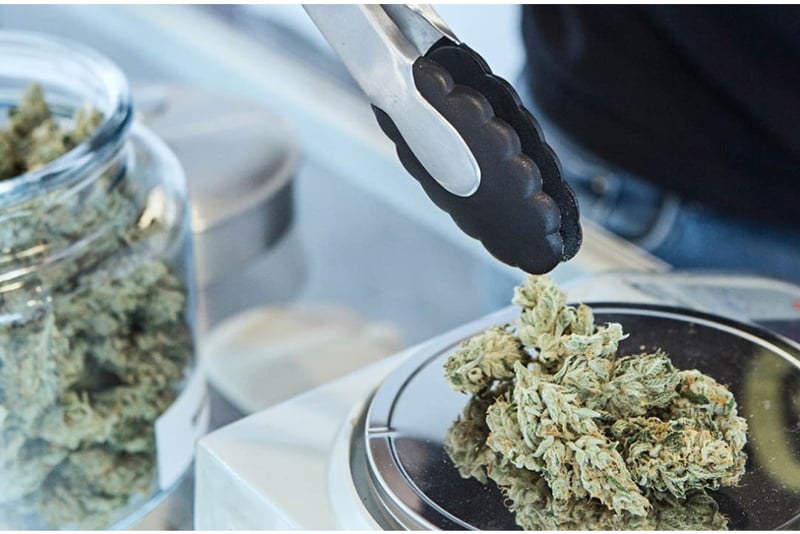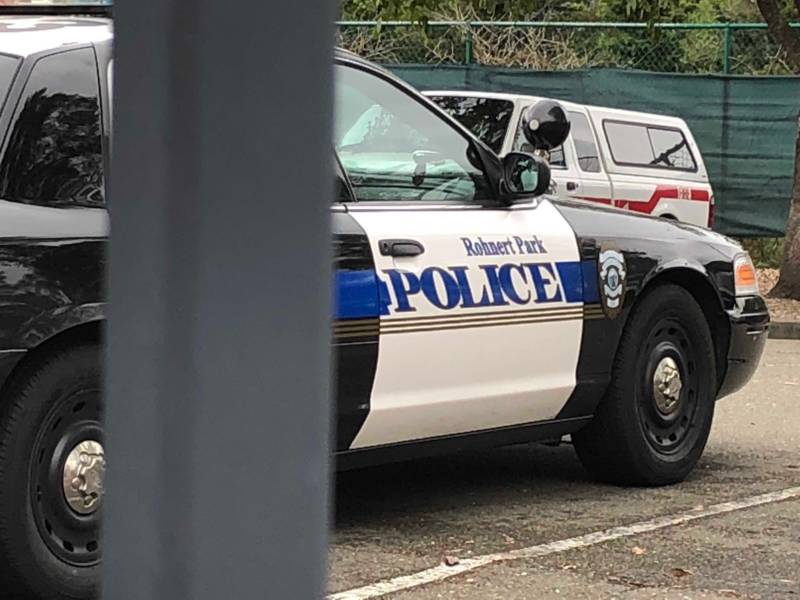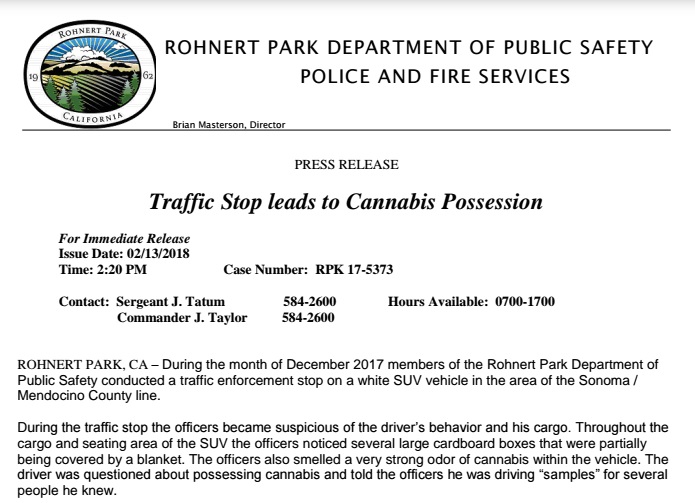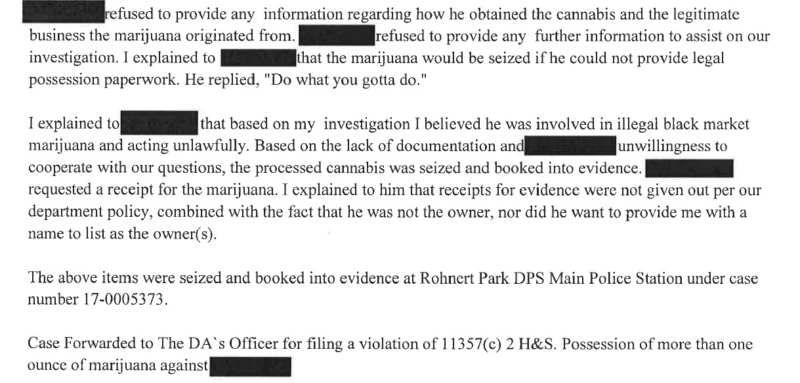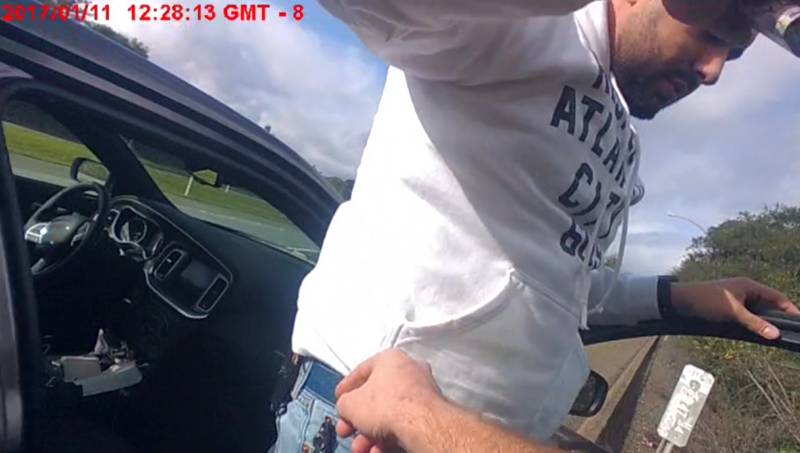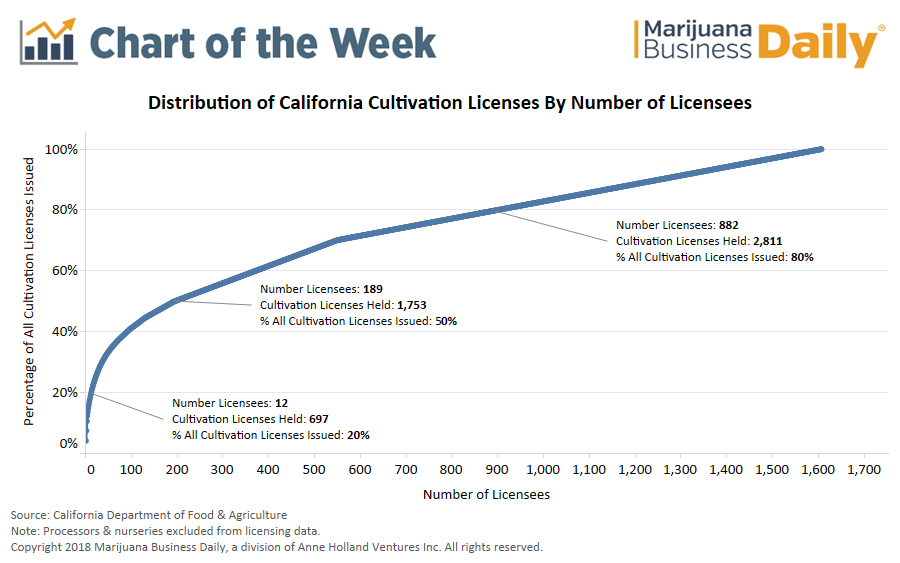I hope pricks like this make a mistake and pull this asset forfeiture robbery shit off on some billionaire. Someone with the deep pockets and savvy to sue them from the Mayor on down to the City Hall janitorial staff.
Three is a lot of bleating and hand wringing lately as to the state of democracy and rule of law in America this past almost two years. Anybody care to comment on this subject...asset forfeiture? I cannot imagine anything more Un-American and less democratic, than authorizing cops to just take your property and....well, that's it. They just take your property. Its happening all over the country and as far as I can tell nothing...I say nothing has happened to punish the responsible authorities.
‘Highway Robbery’: Drivers Allege Rohnert Park Police Illegally Seized Cannabis, Cash
Huedell Freeman was heading south on Highway 101 through Cloverdale and was just over the Sonoma County line when he said a police squad car flipped a U-Turn across a 25-foot grass median and pulled up behind him with lights flashing.
'
He grinned and smiled at me and did not respond. At that moment I knew I'd been had. I knew that this was not a normal traffic stop.'Huedell Freeman
Freeman said he was carrying 47 pounds of marijuana in his rental car that day, Dec. 29, 2016, but said he wasn’t too worried about the weed because he had a
permit to grow medical cannabis in Mendocino County. He was driving it down to his client, a licensed dispensary called
The Higher Path in Sherman Oaks, near Los Angeles. And, he said, he had the paperwork to prove it.
It struck Freeman as odd, though, that the two police officers pulling him over weren’t from Cloverdale. They were from Rohnert Park, some 40 miles south on 101. Freeman said he’d been obeying the traffic laws, and the cruise control on the car was set at the speed limit. He expected the traffic stop to end quickly.
Sponsored By
He didn’t expect to lose a year’s worth of income.
As Rohnert Park Department of Public Safety Officer Joseph Huffaker approached the car, Freeman said he rolled down his window and asked why he’d been pulled over.
Freeman said Huffaker told him his vehicle had “touched the white line” on the side of the road.
“I had not, so I looked at him, and I said, ‘No I didn't,’ ” Freeman said. “And he grinned and smiled at me and did not respond. At that moment I knew I'd been had. I knew that this was not a normal traffic stop.”
Then Huffaker asked if he had any marijuana in his car, Freeman said.
A Rohnert Park police squad car. (Sukey Lewis/KQED)
“Yes, I do,” Freeman remembered saying. He also carried a large battered black leather briefcase filled with documentation -- what he calls his “compliance briefcase” -- and he said he provided the officer with a grower’s permit issued by the Mendocino County Sheriff's Office, contact information for The Higher Path dispensary with which he had an agreement to both grow and transport marijuana, and his compliance lawyer’s information.
Essentially, Freeman was trying to be as
legitimate as he could be.
Freeman said that as he and Huffaker talked, another Rohnert Park officer, Sgt. Jacy Tatum, stood off to the side, barely speaking except to ask Freeman at one point about the strains of marijuana he was carrying.
The two officers would go on to seize that marijuana, and Freeman hasn’t seen it since. But, an odd fact remains about this seizure: No case against Freeman was ever referred to the district attorney for prosecution.
Freeman’s account of his run-in with Rohnert Park police echoes those of eight other drivers who say a group of officers from the city conducted pretextual traffic stops -- those that enable authorities to detain suspects for investigation of other matters -- with the goal of unlawfully seizing marijuana and cash. Four people allowed us to share their stories publicly, while five others would tell us about their encounters only if we agreed not to name them, saying they feared police retaliation.
Their stories suggest a pattern of questionable and potentially illegal stops and seizures over the past three years by officers from a small city along a major marijuana transportation corridor.
'
When I say highway robbery, I really mean it.'Izaak Schwaiger,
Attorney, former prosecutor
The city of Rohnert Park said in a statement that its police officers “joined other law enforcement agencies in drug interdiction efforts” along Highway 101 seeking drugs including “methamphetamines, opioids, cocaine, ecstasy and marijuana.” But the city says it ceased “most interdiction efforts” related to marijuana in 2017.
There is a financial benefit to the city for this work. Through a legal process called asset forfeiture, both the Rohnert Park Department of Public Safety and the Sonoma County District Attorney’s Office get to keep a cut of seized cash suspected to be the proceeds of a crime.
A
report issued by the California Attorney General shows that from 2015 to 2016, the Rohnert Park Department of Public Safety received more than $1 million in seized cash. The Sonoma County District Attorney received $188,419 of the money from assets seized.
Tatum was responsible for much of that asset forfeiture windfall to his local department. In 2015, the mayor
publicly recognized him for his drug prevention work. Tatum
thanked the City Council for allowing him the opportunity to “fight the war on drugs.”
But Tatum has another reputation: A growing chorus of defense attorneys say he’s a rogue cop. He’s being sued for unlawfully taking a man’s cash, and he has a documented history of dishonesty on the witness stand.
“When I say highway robbery, I really mean it,” Sonoma County defense attorney Izaak Schwaiger said. “Officer Tatum has been involved in dozens of questionable traffic stops both above and below the Mendocino-Sonoma County line, where he has seized marijuana farmers’ product and/or their cash and given them no receipt and no criminal charges were ever brought.”
Now Tatum and his partner, Joseph Huffaker, are
under investigation by the city of Rohnert Park. They are both on leave, according to their attorney.
Allegations of a Cover-Up
Rohnert Park began an administrative investigation around April of this year after independent reporter Kym Kemp
published a
series of articles about another suspect traffic stop and marijuana seizure.
Texas resident Zeke
Flatten said he was driving south on Highway 101 last December, when an unmarked black Ford Police Interceptor pulled him over just north of the Mendocino County line, about 50 miles north of Rohnert Park.
Jacy Tatum is sworn in as a Rohnert Park police sergeant in July 2015. (City of Rohnert Park Police & Fire Facebook page)
Flatten, like Freeman, was also in a rental car and said he, too, was not speeding or violating any traffic laws. He pulled over and showed the officer his driver’s license and the rental agreement for his car.
The officers did not identify what agency they were with, Flatten said, and he noticed they were not wearing departmental police badges or identifying name tags.
“At that point I really felt something was wrong,” Flatten said.
Flatten said he had 3 pounds of marijuana in his car from a farm in Humboldt County and he was taking it to a laboratory in Santa Rosa for testing. He said he was working on developing a number of cannabis products he hoped to bring to market after California’s law allowing recreational use for adults kicked in.
Flatten also offered to show the officers his doctor’s prescription for medical cannabis, but he said they weren’t interested.
The officers said they were working for the ATF -- the U.S. Bureau of Alcohol, Tobacco, Firearms and Explosives -- according to Flatten. He said they took his marijuana and left him on the side of the road, all in just a few minutes. They did not issue him a citation or arrest him.
Flatten reported the Dec. 5 incident to the Mendocino County Sheriff’s Department, the Mendocino County district attorney, the Mendocino County grand jury and the FBI. Kemp spoke with an ATF spokesperson who said the agency wasn’t involved in Flatten’s traffic stop.
From a Rohnert Park Department of Public Safety press release issued on Feb. 13, 2018.
“Mr. Flatten did contact the FBI and the information he provided, we were not able to corroborate it as reported,” FBI spokesperson Prentice Danner said.
The Mendocino County Sheriff’s Department said it wasn’t their case and pointed to a
press release from Rohnert Park police written on Feb. 13, 2018, not long after Flatten’s stop. The statement, written by Tatum and Cmdr. Jeff Taylor, touted a large “black market” marijuana bust on Highway 101 during the month of December.
Rohnert Park produced an
incident report of the Dec. 5 stop of Flatten, also written by Tatum, that diverges in many places from Flatten’s account.
The redacted report doesn’t include any names. It describes a traffic stop involving a white Mercedes-Benz with no license plates. Yet Flatten said he drove a Kia rental car with California license plates. The report says that 30 pounds of marijuana and several hundred containers of hash were seized from the person driving the Mercedes. Flatten maintains he had 3 pounds of marijuana with him.
Records show that Officer Huffaker did book 30 pounds of
seized marijuana into evidence, but not until Dec. 18, 2017, nearly two weeks later. The several hundred containers of hash are not mentioned in the evidence log.
Flatten doesn’t believe Tatum was among the two officers who stopped him, although he does think Rohnert Park Officer Huffaker was one of the officers who pulled him over.
An excerpt from the incident report written by Jacy Tatum
and referenced in response to Zeke Flatten's allegations.
The report says a CHP officer and trainee assisted on Flatten’s stop. But a CHP spokesman wrote in an email, “There is no dispatch record of us assisting with this incident and no one recalls it.”
Flatten said he thinks Tatum crafted this report after the fact to cover up an illegal stop and seizure by police officers.
“I felt very strongly that I was robbed by legitimate police officers,” Flatten said.
Finally, the report said the case was referred to the Sonoma County district attorney for prosecution. The Sonoma County District Attorney’s Office has no record that Rohnert Park ever referred a case against Flatten. There are no charges against him.
The city of Rohnert Park would not respond to questions about this incident, but it is investigating. Attorney Justin Buffington, who is representing Tatum and Huffaker, confirmed the officers are on leave pending an administrative investigation related to Flatten. He stressed that the city’s probe is not a criminal investigation.
Tatum and Huffaker did not wish to comment for this story, according to Buffington.
Seizing Cash
This is not the first time Rohnert Park police officers have faced allegations of unlawful seizure. A gambler from Las Vegas named Lucas Serafine alleges in a
lawsuit against the City of Rohnert Park that Tatum and Rohnert Park police Officer Nick Miller unlawfully seized more than $120,000 from him on March 10, 2016.
Serafine was also in a rental car traveling on Highway 101 near Cloverdale with a friend when he said the two officers pulled him over for allegedly driving too fast in the rain.
Serafine said he was headed to a high-stakes poker game at the Bear River Casino in Humboldt County and that the large amount of cash in the car was cash from a lawsuit he settled with the California Department of Corrections, and a workers' compensation claim.
The officers suspected Serafine’s money was related to drug purchase or sales, according to
court documents, and seized it.
“He [Tatum] looks me in the eyes, pointing his finger pushing on my chest as he does it," Serafine remembered Tatum saying before he and Officer Miller drove away, “‘I took $1.2 million off the road this year. Nobody shows up for it and neither will you’.”
Highway 101 in Cloverdale. (Adam Grossberg/KQED)
A review of incident reports provided by Rohnert Park in response to a public records request back up the statement. KQED reviewed 23 incident reports on traffic stops involving Tatum. The city continues to provide more reports on a rolling basis.
Between late 2013 and the end of 2016, Tatum was involved in stops that resulted in the confiscation of well over $1 million in cash, according to the incident reports released so far.
The department saw a 182 percent increase in funds from asset forfeitures between 2015 and 2016. According to
data reported to the California Attorney General’s Office, Rohnert Park police netted $756,062 in 2016, an increase of nearly half a million dollars from the year before.
In Serafine’s case, $121,920 was logged into evidence and turned over to the district attorney for asset forfeiture proceedings.
On June 28, 2016, Serafine's lawyer sent a
letter to Rohnert Park contesting the amount of money seized, but Serafine says he did not get a response. Serafine said he actually had $132,000.
The district attorney brought a civil action to seize Serafine’s cash -- a process called asset forfeiture. Serafine provided the prosecutors with proof of income for most of the cash and eventually got $100,000 of his money returned to him.
The Sonoma County District Attorney’s Office declined to comment on Serafine’s asset forfeiture case or to say whether they investigated Serafine’s dispute about the amount of cash seized.
The city is
fighting Serafine’s lawsuit alleging police officers inappropriately confiscated his cash. A trial in that case is scheduled for November of this year.
Serafine has a criminal history, including a conviction in 2001 when he was 18, for unlawful sex with a minor. Serafine was forthcoming about his record.
'
That is a very strong indication, based on the law, that the complaints, assuming there were such, were deemed frivolous by the department.'Justin Buffington,
Attorney for Sgt. Jacy Tatum and Officer Joseph Huffaker
And Zeke Flatten admits he didn’t have a legal license to transport marijuana, but he said that still doesn’t give law enforcement the right to essentially steal from people.
“I knew that what these officers were doing was so much of abuse of power and so just wrong for police officers to be doing that,” Flatten said.
Tatum's attorney, Justin Buffington, said he is not under investigation for any additional matters.
“To my knowledge, none of the other matters [aside from the Flatten stop] that you referenced are, or have been, the subject of internal investigations undertaken by the department,” Buffington wrote in an email. “That is a very strong indication, based on the law, that the complaints, assuming there were such, were deemed frivolous by the department.”
An Unreliable Witness
At least a year before Flatten went public with his allegations against Rohnert Park police, Tatum was known by prosecutors to have written false information in police reports and to have testified dishonestly in court.
“He [Tatum] doesn't have a problem lying, and he does so with some regularity,” said Izaak Schwaiger a civil rights and defense attorney who has had run-ins with Tatum.
Schwaiger, who was a Sonoma County prosecutor from 2010 to 2012, said then-officer Tatum already had a reputation.
“His testimony was not of the highest quality,” Schwaiger said. “And sometimes gave rise to people disbelieving it, even on the side of law enforcement.”
Later, when Schwaiger became a defense attorney, the stories about Tatum mounted.
KQED has spoken to five defense attorneys in Sonoma County who say their clients alleged that Sgt. Tatum and often his partners stopped them on a flimsy pretext, fabricated police reports, and unlawfully seized cash and marijuana.
In 2016 Sgt. Tatum entered false information into an incident report. He and Huffaker pulled over a New Jersey man named Konstantine Charalidis, who the DA charged with having a concealed weapon. Charalidis’ attorney, Evan Zelig, provided KQED with Huffaker’s body-camera footage from the stop. It contradicts the police report written by Tatum.
The
incident report says that a knife taken off Charalidis was “completely concealed” by his clothing. Huffaker’s body-camera footage shows Charalidis immediately pointed out both knives, neither of which were concealed.
“There's a difference between incorrect police reports and police reports that are falsified,” Zelig said. “The one with Mr. Charalidis, this was not incorrect. It was just falsified. The facts in there were not true.”
In the body-camera footage, both Huffaker and Tatum ask repeatedly whether there is any cash in the car, which Charalidis and his friend deny. Then Tatum says on the body-camera video he found $10,000.
A screenshot from his body camera footage captures Rohnert Park Department of Public Safety Officer Joseph Huffaker reaching to remove two knives from Konstantine Charalidis' clothing after Charalidis immediately told the officer he had them. Both knives were unconcealed throughout the encounter. (Courtesy of Evin Zelig)
Zelig said the officers became angry at Charalidis because he wouldn’t admit that $10,000 was related to illegal activity, which would have allowed them to seize it.
“Give us fucking bullshit ass fucking answers, that’s what happens,” one of the officers says on the body-camera footage as Charalidis stands handcuffed. “We’re going to see a judge.”
The police report does not mention any money.
“It was absolutely an unlawful arrest,” said Zelig, “that they did solely because he would not give them the money.”
Prosecutors dismissed the charges against Charalidis because of the body-camera footage. Zelig says his client still had to pay attorneys fees, and deal with the hassle of a California court case while living in New Jersey.
In a separate 2016 case, Schwaiger suspected Tatum was lying about his justification for a traffic stop. He collected
sworn statements from three other defense attorneys who said Tatum was dishonest and detailed specific instances of him lying.
Tatum’s dishonest testimony in that case led him to be placed on a list of officers with credibility issues maintained by the Sonoma County District Attorney's Office, Schwaiger and other defense attorneys said. Tatum gave shifting explanations in an attempt to justify the traffic stop and was caught lying on the witness stand. A judge dismissed the case.
'
If or when concerns are raised about police officer conduct, we take the concerns seriously.'Don Schwartz,
Rohnert Park Assistant City Manager
Being on what’s called “the Brady list” meant, after that case, prosecutors had a duty to disclose evidence of Tatum’s past dishonest testimony to defense attorneys, who can use it to attack his credibility if he’s called as a witness.
The Sonoma County District Attorney’s Office declined to comment on Tatum’s credibility as a witness, but no perjury charges have been filed against him.
Schwaiger and another defense attorney say they were both interviewed by an investigator for the DA’s office regarding Tatum, but prosecutors would not say what the nature or the outcome of this investigation was.
“People want to believe police officers because we don't want to live in a world where cops can't be trusted,” Schwaiger said. “That's a scary world. Those are the people that are here to protect us. They're the people here to keep us safe. And if they can't be trusted, who can be?”
Broken Trust
For years, unlawful seizures and asset forfeitures were often considered by people in the marijuana industry as the cost of doing business. But now, legalization is offering men like Huedell Freeman a path to legitimacy. He pays taxes and permit fees --
those are the costs of doing business.
Freeman remembered the day in 2015 when a deputy from the Mendocino County Sheriff’s Office took his picture in front of his cannabis farm.
“‘You don’t know how weird this is for me’,” Freeman recalled saying to the deputy. “And he laughed and he said, ‘I think I do,’ he said. ‘We used to call this evidence. Now we call it verification’.”
It was scary to go legal, Freeman said, but it felt good, too: no more lying, no more hiding, no more risk of going to prison for doing what he loves. Now he grows more than a dozen varieties of cannabis that are tailored to specific medical ailments.
“I don't care about the 22-year-olds that want to get stoned and park on the couch,” he said. “I have nothing against that, but that's not why I do this.”
Huedell Freeman. (Sukey Lewis/KQED)
Freeman said he explained all this to Tatum and Huffaker. He had nothing to hide. He gave them the name and phone number of Colin Stewart, manager and partner at The Higher Path dispensary in Sherman Oaks. Huffaker spoke to Stewart and to Freeman’s attorney, Hannah Nelson, who both confirmed what Freeman said: His cannabis was for medicine, not the black market. He was legit.
But the officers came back and told Freeman that they were seizing his property because he did not have a license issued by the state to transport marijuana.
The state Bureau of Cannabis Control declined to comment for this story and refused repeated requests to explain licensing and regulations for transporting marijuana legally in California.
The officers wrote Freeman a
citation for possessing more than an ounce of marijuana, but they did not give him any documentation for the property they seized.
The Sonoma County District Attorney’s Office said no case against Freeman was ever referred to them.
Freeman said he called the Rohnert Park Department of Public Safety the next day. Sgt. Eric Matzen assured him that his cannabis was safe and that if the department determined its legality, he would get it back, Freeman said.
Freeman’s attorney
wrote to the city and asked for it to return her client’s property. But the city of Rohnert Park never returned Freeman’s cannabis.
On June 27, 2017, he filed a claim against the city of Rohnert Park for the value of his cannabis. The city has rejected his claim.
Assistant City Manager Don Schwartz would not respond to a series of detailed questions about traffic stops by its officers.
"Rohnert Park is committed to compliance with the law and the constitution and its mission to serve and protect the public," Schwartz wrote in an emailed response. "If or when concerns are raised about police officer conduct, we take the concerns seriously and investigate as each situation may warrant. Once all of the facts are known, we take any and all appropriate measures."
The statement continued: “Rohnert Park participated in these [interdiction] efforts to reduce the flow of illegal drugs to Sonoma County, including the City of Rohnert Park,” Schwartz wrote. “Recreational marijuana was illegal until January 1, 2018.”
Freeman said he has still not recovered from the financial loss of his property. But he said even harder to recover is the faith he lost in a system that promised to protect him if he came out of the shadows.
“They broke my trust,” Freeman said.

